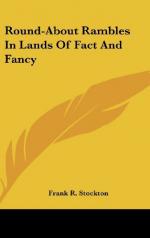[Illustration]
Pigeons are in one respect even more closely associated with man than the domestic fowls, because they live with him as readily in cities as in the country. City chickens always seem out of place, but city pigeons are as much at home as anybody else. There are few houses so small that there is not room somewhere for a pigeon-box, and there are no roofs or yards so humble that the handsomest and proudest “pouters” and “tumblers” and “fan-tails” will not willingly come and strut and coo about them as long as they receive good treatment and plenty of food.
But apart from the pleasure and profit which these beautiful birds ordinarily afford to their owners, some of them—the carriers—are often of the greatest value, and perform important business that would have to be left undone if it were not for them. The late war in France has fully proved this. I remember hearing persons say that now, since telegraph lines had become so common, they supposed carrier-pigeons would no longer be held in esteem, and that the breed would be suffered to die out.
[Illustration]
But that is a mistake. There are times, especially during wars, when telegraphic and railroad lines are utterly useless, and then the carrier-pigeon remains master of the situation.
The doves are such near relations of the pigeons that we might suppose they would resemble them in their character as much as in appearance. But they are not very much alike. Doves are not ambitious; they don’t pout, or tumble, or have fan-tails. As to carrying messages, or doing anything to give themselves renown, they never think of it. They are content to be affectionate and happy.
And that is a great deal. If they did nothing all their lives but set examples to children (and to their parents also, sometimes), the doves would be among our most useful little birds.
[Illustration]
I suppose we all have some friends whom we are always glad to see, even if they are of no particular service to us. And this is right; we should not value people’s society in exact proportion to what we think we can get out of them. Now, the swan is a feathered friend, and a good one, but I must say he is of very little practical use to us. But there is something more to be desired than victuals, clothes, feather-beds, and Easter-eggs. We should love the beautiful as well as the useful. Not so much, to be sure, but still very much. The boy or man who despises a rose because it is not a cabbage is much more nearly related to the cows and hogs than he imagines. If we accustom ourselves to look for beauty, and enjoy it, we will find it, after awhile, where we never supposed it existed—in the caterpillar, for instance, and in the snakes. There is beauty as well as practical value in almost everything around us, and we are not the lords of creation that we suppose we are, unless we are able to see it.
Now, then, I have preached you a little sermon, with the swans for a text. But they are certainly beautiful subjects.




